60 Blue Ribbon College Farms
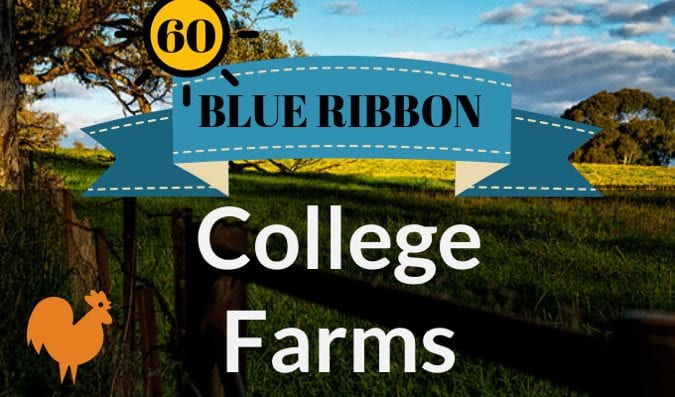
Find your degree

October is Farm to School Month, a time to celebrate locally produced and sustainable food sources. Established in 2010 by the United States Congress, Farm to School Month provides demonstrations of the vital importance of farm to school programs in the areas of improving child nutrition, of supporting local economies and to educating children about the origins of the food on their plates.
The 2016 Farm to School Month’s theme is “One Small Step,” to demonstrate that anyone–no matter how big or small–can impact and get involved in the local food production.
Every week of National Farm to School Month, students celebrate a different overarching theme:
- Farm Education (October 3rd through the 7th);
- Healthy School Meals (October 10th through the 14th);
- Farmers and Producers (October 17th through the 21st) and;
- The Next Generation (October 24th through the 28th)
Methodology:
The following schools will be participating in this exciting program this year (2016) and Online College Plan has ranked them based on the following criteria:
- Farm Size in Acres: 0 to 9-acres = 1 point; 10 to 49-acres = 2 points; 50 to 99-acres = 3 points; and 100-acres+ = 5 points
- Crop Variety: 1 point per crop type
- Sustainability-Related Degree Options = 5 points
In the event of a tie, schools were ranked based on the alphabetical ordering of the school’s name.
We also consulted our own ranking of the top 100 best online colleges while researching this ranking.

Northfield, MinnesotaFarm Size: 1.5-acres
Crop Types: Mixed Crops
Final Score: 7
As a private, liberal arts college that is located in Northfield, Minnesota, Carleton College was originally established in the year of 1866 and was originally known as the Northfield College. Carleton College offers 39 different majors and 16 concentrations and is currently accredited by the North Central Association of Colleges and Schools. The school year follows a trimester system, which is uncommon in postsecondary institutes.
The Student Farm at Carleton College is a 1.5-acre area that is utilized to grow sustainable and organic crops. The farm features drip irrigation and hoop houses, and all of the crops are sold to Carleton College’s dining hall, with the proceeds from the sales going towards paying the student interns that work the fields–of which two are chosen each school year.
Program’s Webpage: https://apps.carleton.edu/sustainability/campus/land/farm/

Pittsboro, North CarolinaFarm Size: 5-acres
Crop Types: Mixed Crops
Final Score: 7Established in 1961, Central Carolina Community College (which is commonly referred to as CCCC) is a public two-year college with campuses located in Sanford, North Carolina; Buies Creek, North Carolina; and Pittsboro, North Carolina. CCCC has one of the few Laser-Photonics Technology programs that is offered at a community college in the United States.
The Land Lab at the Sustainable Farming Program is a 5-acre area that is designated for organic and sustainable agricultural endeavors. The farm produces a wide variety of vegetables, which are available to Central Carolina Community College’s students and faculty and the surrounding community of Pittsboro, North Carolina (CCCC’s main campus).

Program’s Webpage: https://www.cccc.edu/news/story.php?story=192
Fort Collins, ColoradoFarm Size: 0.33-acres
Crop Types: Mixed Crops
Final Score: 7Located in Fort Collins, Colorado, Colorado State University (which is commonly referred to as Colorado State or simply as CSU) is a public land-grant research university and is the flagship university of the Colorado State University System. The school, which was originally established in the year of 1870 (before Colorado had attained statehood) by the Morrill Act which was signed by the then-Colorado Territory Governor Edward M. McCook.
The Colorado State University Student Organic Garden and Market is a 0.33-acre area that is reserved for sustainable and organic farming. The farm provides the school’s students with experiential learning opportunities and research opportunities. The farm also provides the school’s students and faculty and the surrounding communities with affordable, fresh produce which are sold at local farmer’s markets.
Program’s Webpage: https://blog.sustainability.colostate.edu/?q=ssg

Bellingham, Washington
Farm Size: 5-acres
Crop Types: Mixed Crops
Final Score: 7The Fairhaven College of Interdisciplinary Studies (which is commonly referred to as Fairhaven College) is an interdisciplinary liberal arts college and a branch of the Western Washington University. Instead of completing the general education requirements at Western Washington University, many students take interdisciplinary classes at Fairhaven which aim to cover the core classes, but within small, interdisciplinary seminars.
The Outback Farms & Outdoor Experiential Learning Site is a 5-acre farm and wetland restoration site. The farm grows sustainable and organic produce and provides the school’s students with experiential farming education opportunities and with sustainable and organic farming research opportunities. Additionally, the farm provides the school’s students and faculty and the citizens of the surrounding communities with low-cost, fresh and organic produce through various sales, with proceeds put towards farm maintenance.

Ames, IowaFarm Size: 6-acres
Crop Types: Mixed Crops
Final Score: 7Iowa State University of Science and Technology (which is commonly referred to as Iowa State University or simply ISU) is a land-grant and space-grant, public research university located in Ames, Iowa and was originally established in the year of 1858 as the Iowa Agricultural College and Model Farm and later as the Iowa State College of Agriculture and Mechanic Arts.
The ISU Student Organic Farm is a 6-acre farm that is used to grow organic and sustainable crops. The farm provides students, faculty and the community with affordable produce. Also, the farm provides students with hands-on experience in various aspects of agriculture and provides agricultural research opportunities.
Program’s Webpage: https://www.agron.iastate.edu/studentfarm

Fairfield, IowaFarm Size: 3-acres
Crop Types: Mixed Crops
Final Score: 7Located in Fairfield, Iowa, Maharishi University of Management is a private, not-for-profit university that was originally established in the year of 1973 by Maharishi Mahesh Yogi, a disciple and assistant of Swami Brahmananda Saraswati, the Shankaracharya of Jyotirmath and guru to the Beatles and The Beach Boys, and features a “consciousness-based education” system that includes the practice of the Transcendental Meditation technique.
The Maharishi Vedic Organic Agriculture Institute is a 3-acre area that is utilized to grow sustainable and organic mixed crops, which are available to the school’s students and faculty and the surrounding community. In the 2015 harvest year, the school produced over 200,000 pounds of Vedic Organic vegetables.
Program’s Webpage: https://www.mvoai.org/

State College, PennsylvaniaFarm Size: 9-acres
Crop Types: Mixed Crops
Final Score: 7Founded in 1855, Pennsylvania State University (which is commonly referred to as PSU) is a land-grant, sea-grant, space-grant and sun-grant “Public Ivy” research university located in State College, Pennsylvania. PSU is one of the largest postsecondary educational institutions located within the United States based on total student enrollment, with approximately 46,800 graduate and undergraduate students enrolling yearly.
The Center for Sustainability at Pennsylvania State University is a 9-acre research area that is designated for studying and learning about sustainable energy and farming techniques and features farmland, a greenhouse, a solar home, a wind turbine and The Hybrid Renewable Energy Systems Laboratory (Hyres Laboratory).
School Profile
Program’s Webpage: https://sustainability.psu.edu

Orono, MaineFarm Size: 2-acres
Crop Types: Mixed Crops
Final Score: 7The University of Maine (which is commonly referred to as UMaine or simply as UM) is a public research university that is located in Orono, Maine. The school was originally established in the year of 1865 as a land-grant college, and it is currently the flagship university of the University of Maine System.
Black Bear Food Guild was established by several Sustainable Agriculture students in 1994 at Rogers Farm, an area of local farmland, to obtain a more hands-on education. The farm is 2-acres and crop shares can be purchased yearly from the farm.
Program’s Webpage: https://www.umaine.edu/pse/sag/BBFG/BBFG.html
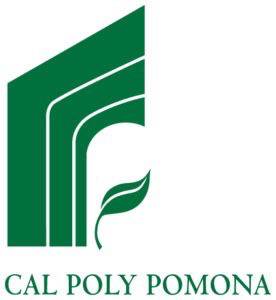
Pomona, CaliforniaFarm Size: 16-acres
Crop Types: Mixed Crops
Final Score: 8California State Polytechnic University – Pomona (which is commonly referred to as Cal Poly Pomona, Cal Poly or simply as CPP) is a public space-grant polytechnic university and is located in Pomona, California. California State Polytechnic University is designated as a National Center of Academic Excellence in Information Assurance Education by the United States Department of Homeland Security.
The John T. Lyle Center for Regenerative Studies is a 16-acre area that is reserved for sustainable and organic farming practices, for providing students with experiential agricultural experiences and for providing many research opportunities in the areas of sustainable farming practices and organic crop growing. The farm provides the school’s students and faculty and the surrounding communities with affordable, fresh crops straight from the farm.
Program’s Webpage: https://env.cpp.edu/rs/rs

Eureka, CaliforniaFarm Size: 38-acres
Crop Types: Mixed Crops
Final Score: 8Located in Eureka, California, the College of the Redwoods (which is commonly referred to as CR) is a public, two-year postsecondary educational institute. The College of the Redwoods was originally established in the year of 1964 by a vote of the Humboldt County residents. The College of the Redwoods is accredited by Western Association of Schools and Colleges (WASC) through the regional accreditor Accrediting Commission for Community and Junior Colleges (ACCJC).
The Sustainable Agriculture Farm is a 38-acre area that is designated for sustainable and organic farming. The farm provides the College of the Redwoods’ students with experiential agricultural experiences and organic, sustainable farming research opportunities. The farm also provides the school’s faculty and students and the surrounding communities with fresh, low-cost, sustainable and organic produce.
Program’s Webpage: https://www.redwoods.edu
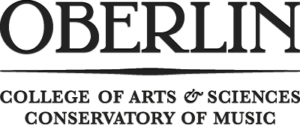
Oberlin, OhioFarm Size: 13-acres
Crop Types: Mixed Crops
Final Score: 8Located in Oberlin, Ohio, Oberlin College is a private liberal arts college that was originally established in the year of 1835 by John Jay Shipherd and Philo Stewart, a pair of Presbyterian ministers, and which was originally known as the Oberlin Collegiate Institute. With its founding, Oberlin College is the oldest coeducational university located within the United States and is the second oldest continuously operating coeducational university in the entire world.
The Oberlin Sustainable Agriculture Project is a 13-acre area where various sustainable and organic crops are grown. The farming area provides Oberlin College’s students with experiential agricultural experience, research opportunities, and fresh produce at a low-cost. The food produced is also available to the surrounding communities through farmer’s markets.

Corvallis, OregonFarm Size: 2-acres
Crop Types: Mixed Crops, Fruits
Final Score: 8Oregon State University (which is commonly referred to as OSU) is a public land-grant, sea-grant, space-grant and sun-grant research university located in Corvallis, Oregon. Oregon State University was originally established in the year of 1868, and the Carnegie Foundation designates Oregon State University as a doctoral university with a “Highest research activity” rating. Oregon State University is the only public research university to obtain all four grant designations (land, sea, space and sun).
The Organic Growers Club Farm is a 2-acre area that is designated for sustainable and organic crop growing. The farm provides Oregon State University’s students with an experiential farming education and with sustainable, organic research opportunities. The farm also provides the school’s students and faculty and the surrounding communities with fresh, organic produce at a low-cost through various sales, with all proceeds going towards farm maintenance.
Program’s Webpage: https://cropandsoil.oregonstate.edu/organic_grower/
School Profile

Prescott, ArizonaFarm Size: 30-acres
Crop Types: Mixed Crops
Final Score: 8Prescott College is a private, not-for-profit liberal arts college that is located in Prescott, Arizona, and was originally founded in the year of 1966 by a group of educators that the Ford Foundation brought together in the year of 1965. The school maintains an approximate student-to-faculty ratio of 7:1 and the school’s motto is For the Liberal Arts, the Environment and Social Justice.
Wolfberry Farms is a 30-acre area that is used for organic and sustainable farming of various vegetables. The farm is also utilized to provide students with an experiential agricultural education, organic and sustainable research opportunities and for providing the school’s students and faculty and the surrounding communities with farm-fresh, organic produce at a low cost.
Program’s Webpage: https://www.prescott.edu/

New Brunswick, New JerseyFarm Size: 5-acres
Crop Types: Mixed Crops, Herbs
Final Score: 8Rutgers, The State University of New Jersey (which is commonly referred to as Rutgers University, Rutgers or simply as RU) is a public research university located in New Brunswick, New Jersey. Originally established in the year of 1766, Rutgers is the eighth-oldest college located within the United States and is one of the nine Colonial Colleges that were chartered before the American Revolution.
The Cook Student Organic Farm is a 5-acre area that provides the foundation for a myriad of community outreach programs, research opportunities, and various entrepreneurial pursuits. The farm also provides students and the surrounding areas with various organic crops, including various squashes and herbs. The Rutgers namesake tomato plant is a heavy producing, disease resistant favorite variety grown in gardens across the country.
Program’s Webpage: https://www.rutgers.edu

Davis, CaliforniaFarm Size: 20-acres
Crop Types: Mixed Crops
Final Score: 8The University of California – Davis (which is commonly referred to as UC – Davis or simply as UCD) is a public land-grant and space-grant research university that is located in Davis, California and was originally established in the year of 1905 and formerly known as University Farm until 1922 and then as Northern Branch of the College of Agriculture until 1959. The Carnegie Foundation classifies UC – Davis as a research university with a very high research activity.
The Davis Student Experimental Farm is a 20-acre area that is utilized to grow sustainable and organic crops. The farm also provides students with experiential agricultural experiences and organic and sustainable farming research opportunities. The farm also provides the school’s students and faculty and the surrounding communities with affordable, fresh, organic crops that are straight from the farm.
Program’s Webpage: https://studentfarm.ucdavis.edu/

Moscow, IdahoFarm Size: 0.25-acres
Crop Types: Mixed Crops, Wheat
Final Score: 8Located in Moscow, Idaho, the University of Idaho (which is commonly referred to as The U of I or simply as UI) is a public land-grant and space-grant research university which was originally established in the year of 1889–making it the state of Idaho’s oldest public university– by the territorial legislature of 1889 which was signed by then-Governor Edward Stevenson. UI is the primary research institute in the state and has the largest campus in the state as a result.
The University of Idaho Student Organic Farm is a 0.25-acre area that is reserved for sustainable and organic farming. The farm provides the students of the University of Idaho with experiential learning opportunities and sustainable, organic agricultural research opportunities. The farm also provides the school’s students and faculty and the surrounding communities with affordable, fresh, organic produce which are sold through farmer’s markets.

Missoula, MontanaFarm Size: 10-acres
Crop Types: Mixed Crops, Fruits
Final Score: 8The University of Montana (which is commonly referred to as UM) is a public research university that is located in Missoula, Montana. The University of Montana was originally established in the year of 1893 by an act of Congress, four years after the state of Montana was admitted to the Union. The University of Montana’s Maureen and Mike Mansfield Library houses the earliest authorized edition of the Lewis and Clark journals, which acts as one of the library’s main gems.
The University of Montana Environmental Studies Department’s Program in Ecological Agriculture and Society (PEAS) Farm is a 10-acre farm located two miles from the school’s campus. The farm provides the University of Montana’s students with experiential learning opportunities and with sustainable, organic agricultural research opportunities. Additionally, the farm sells the produce that it grows to the school’s students and staff and the surrounding communities at a low-cost.
Program’s Webpage: https://hs.umt.edu/evst/opportunities/peas/default.php

Durham, New HampshireFarm Size: 2-acres
Crop Types: Livestock, Mixed Crops
Final Score: 8The University of New Hampshire (which is commonly referred to as UNH) is a public research university with campuses located throughout the state of New Hampshire and is a member of the University System of New Hampshire. UNH was originally established in the year of 1866 as a land-grant college located in Hanover in connection with Dartmouth College. In 1893, UNH’s main campus was moved to Durham, New Hampshire.
The Campus-Community Farm is a 2-acre area that produces organic crops. Crops harvested at the Campus-Community Farm are purchased by UNH’s Dining Services and are sold at a weekly UNH Durham campus farm stand during the growing season. The first growing season on the farm was the spring/summer of 2004.
Program’s Webpage: https://www.unh.edu/

New Haven, ConnecticutFarm Size: 1.5-acres (combined)
Crop Types: Mixed Crops, Poultry
Final Score: 8Yale University is a private Ivy League research university that is located in New Haven, Connecticut and was founded in the year of 1701. Yale has graduated numerous notable alumni, including five Presidents of the United States, 19 Supreme Court Justices, 13 living billionaires and many foreign heads of state. Yale University is also home to the third-largest academic library in the nation, Yale University Library.
The Yale Sustainable Food Project Garden program maintains two small farms which are used for both learning and research; one is located on Yale’s main campus, and the other is situated at the Yale Landscape Lab which is located on the West Campus. The farm located on the main campus is 1-acre in size and the farm located on West Campus is 0.5-acres in size.
Program’s Webpage: https://www.yale.edu/sustainablefood/garden.html

Olympia, WashingtonFarm Size: 5-acres
Crop Types: Mixed Crops, Livestock, Fruits
Final Score: 9The Evergreen State College is a public, liberal arts college that is located in Olympia, Washington. Originally established in the year of 1967 by the Temporary Advisory Council on Public Higher Education, and Evergreen State College was formed to be an experimental and non-traditional college, with full-time students enrolling into interdisciplinary academic programs instead of traditional classes.
The Evergreen State College Organic Farm is a 5-acre area that is utilized for sustainable and organic crop production. The farm provides the students of Evergreen State College with an experiential education in sustainable and organic agricultural practices and with research opportunities. The farm also sells its produce weekly to the school’s students and faculty and the residents of the surrounding communities at a low-cost, with proceeds going towards the management of the farm.
Program’s Webpage: https://evergreen.edu/organicfarm

Middlebury, VermontFarm Size: 2-acres
Crop Types: Mixed Crops, Herbs, Flowers
Final Score: 9Located in Middlebury, Vermont, Middlebury College is a private liberal arts college that was originally founded in the year of 1800 by Congregationalists (a sect of Protestant Churches), making it the first operating postsecondary educational institute within the state of Vermont. Middlebury was originally an all-male school until 1883 when it became a coeducational institute.
Slow the Plow, Middlebury College’s Organic Garden is a 2-acre area designated for growing sustainable and organic crops, which are then, in turn, supplied to Middlebury College’s students and faculty and the area’s community through crop-sharing initiatives, farmer’s markets and the school’s very own dining hall. The farm grows vegetables, herbs and a variety of flowers.
Program’s Webpage: https://www.middlebury.edu/sustainability/food/farm

Las Cruces, New MexicoFarm Size: 1.6-acres
Crop Types: Mixed Crops, Flowers, Herbs
Final Score: 9The New Mexico State University (which is commonly referred to as NMSU-Las Cruces, New Mexico State, NM State or simply as NMSU), is a public land-grant research university located in Las Cruces, New Mexico. The New Mexico State University was originally established in the year of 1888 as the Las Cruces College (which was later known as the New Mexico College of Agriculture and Mechanic Arts) by Hiram Hadley, who was an Earlham College-educated teacher from the state of Indiana.
The Organic Agriculture Students Inspiring Sustainability (OASIS) is a 1.6-acre area where organic and sustainable vegetable crops, herbs and flowers are grown and tended to by the New Mexico State University’s students–providing them with valuable experiential learning opportunities and with sustainable, organic agricultural research opportunities. The farm also provides the school’s students and faculty and the surrounding communities with low-cost, fresh organic produce.
Program’s Webpage: https://sustainability.nmsu.edu/
School Profile

Minneapolis and St. Paul, MinnesotaFarm Size: 5.5-acres
Crop Types: Mixed Crops, Herbs, Berries
Final Score: 9With a location in both Minneapolis and St. Paul, Minnesota, the University of Minnesota – Twin Cities (which is commonly referred to as U of M) is a public land-grants, sea-grant and space-grant research university which was originally established in the year of 1851. U of M is the oldest and the largest campus within the University of Minnesota system and has the sixth-largest main campus student body in the United States based on student enrollment.
Cornercopia, the Student Organic Farm is a 5.5-acre area that is utilized to grow sustainable and organic crops, provide students with experiential agricultural experiences, provide research opportunities for sustainable agriculture and to provide students, faculty and the surrounding communities with affordable and fresh produce.
Program’s Webpage: https://www.misa.umn.edu/
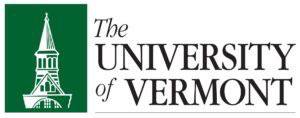
Burlington, Vermont
Farm Size: 3-acres
Crop Types: Mixed Crops, Herbs, Flowers
Final Score: 9The University of Vermont (which is officially known as The University of Vermont and State Agricultural College and is commonly referred to as UVM), is a public land-grant research university. Originally founded in 1791, it is ranked as one of the oldest institutions of higher learning located within the United States.
The Common Ground Student-Run Educational Farm (ACRE – Agriculture Community for Resources and Education) is a 3-acre area designated for organic and sustainable vegetable, herb and flower crops. The farm provides produce for UVM’s students and the surrounding community at an affordable cost. Students can learn about sustainable farming, preserving food, creating dyes and indigenous crops at this farm.
Program’s Webpage: https://thelynx.collegiatelink.net/organization/common-ground-student-run-educational-farm/about

Clemson, South CarolinaFarm Size: 15-acres
Crop Types: Fruits, Mixed Crops, Flowers
Final Score: 10Located in Clemson, South Carolina, Clemson University is a public land-grant and sea-grant research university that was originally established in the year of 1889 as the Clemson Agricultural College of South Carolina. Clemson University is classified as a research university with a Highest Research rating based on the Carnegie Foundation’s ratings.
The Calhoun Field Laboratory’s Sustainable Farming Project is a 15-acre area that provides Clemson University students with experiential sustainable and organic agricultural experiences through research and instructions. The farm–which includes crops, orchards, and flowers–also provides the school’s students and the surrounding communities with cost-friendly fresh produce.
Program’s Webpage: https://www.clemson.edu/cafls/l
School Profile

Hanover, New HampshireFarm Size: 2-acres
Crop Types: Flowers, Herbs, Vegetables, Fish
Final Score: 10Dartmouth College is a private Ivy League research university that is located in Hanover, New Hampshire. Dartmouth College was originally established in the year of 1769 by Eleazar Wheelock. Dartmouth College is one of the nine original Colonial Colleges that were chartered before the American Revolution took place.
Dartmouth College Organic Farm is a 2-acre area that produces many sustainable crops, including 25 different flower species, herbs, and vegetables ranging from sweet corn to radishes and many others which are all certified organic in both their growing and their harvesting. In addition, there are areas that are designated for fishing.
Program’s Webpage: https://webster.dartmouth.edu/%7Eopo/organicfarm

Richmond, IndianaFarm Size: 11-acres
Crop Types: Mixed Crops, Hay, Fruit
Final Score: 10Located in Richmond, Indiana, Earlham College is a private, liberal arts college that was originally established in the year of 1847 by the Religious Society of Friends (who are Quakers). The school is still a Quaker-affiliated postsecondary educational institute, which leads them to provide an education which is deeply rooted in Quaker values such as integrity, a commitment to peace and social justice, mutual respect and community decision-making.
The Miller Farm (Suzanne Hoerner Equestrian Center) is an 11-acre area that is designated for organic, sustainable agricultural practices, experiential learning opportunities, and research opportunities. The program at Miller Farm was on a two-year hiatus but started up again in the 2015 school year at a new location, adjacent to the Suzanne Hoerner Equestrian Center.
Program’s Webpage: https://earlham.edu/about/sustainability/

Eureka, CaliforniaFarm Size: 38-acres
Crop Types: Mixed Crops
Final Score: 10Located in Eureka, California, the College of the Redwoods (which is commonly referred to as CR) is a public, two-year postsecondary educational institute. The College of the Redwoods was originally established in the year of 1964 by a vote of the Humboldt County residents. The College of the Redwoods is accredited by Western Association of Schools and Colleges (WASC) through the regional accreditor Accrediting Commission for Community and Junior Colleges (ACCJC).
The Sustainable Agriculture Farm is a 38-acre area that is designated for sustainable and organic farming. The farm provides the College of the Redwoods’ students with experiential agricultural experiences and organic, sustainable farming research opportunities. The farm also provides the school’s faculty and students and the surrounding communities with fresh, low-cost, viable and organic produce.
Program’s Webpage: https://www.redwoods.edu/academics/cte/agriculture/farm
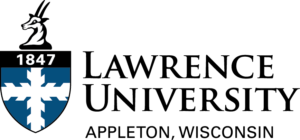
Appleton, WisconsinFarm Size: 0.25-acres
Crop Types: Mixed Crops, Fruits, Flowers, Herbs
Final Score: 10Lawrence University (which is commonly referred to as LU) is a private liberal arts university that is located in Appleton, Wisconsin and was originally established in the year of 1847 as the Lawrence Institute by William Harkness Sampson and Henry R. Colman. Lawrence University is a member of the Colleges That Change Lives group and is one of the Great Books Colleges.
The Sustainable Lawrence University Garden (SLUG) is a 0.25-acre area which is reserved for sustainable and organic farming. The area is used to grow various vegetables, an orchard and flower and herb gardens. The garden also has an apiary with three hives that produced an amazing 200 pounds of honey this season. Students, faculty, and the surrounding community are encouraged to purchase the grown crops, and the proceeds are used to pay for the farm upkeep costs.
Program’s Webpage: https://www2.lawrence.edu/sorg/slug/index.html

Ashland, WisconsinFarm Size: 10-acres
Crop Types: Mixed Crops, Eggs, Herbs
Final Score: 10Established in the year of 1892 as the North Wisconsin Academy and located in Ashland, Wisconsin, Northland College is a private, not-for-profit liberal arts college. Originally a Congregational Church-affiliated Institute, the school still has loose ties to the United Church of Christ today. Northland College is currently accredited by the regional accreditor Higher Learning Commission of the North Central Association of Colleges and Universities.
The Sustainable Agriculture Field School is a 10-acre area designated for sustainable and organic farming. The farms provide the school’s dining hall with 80% of its food, and students, faculty and the surrounding community can purchase affordable, fresh produce from it. In addition, the farm provides experiential learning opportunities and research opportunities into sustainable farming practices.
Program’s Webpage: https://www.northland.edu/sustain/food-systems/food-systems-center/

Fair Oaks, CaliforniaFarm Size: 3-acres
Crop Types: Mixed Crops, Fruits, Honey, Livestock
Final Score: 10Located in Fair Oaks, California, Rudolf Steiner College is one of America’s leading Waldorf teacher education colleges (Waldorf Education–also known as Steiner Education–is a form of teaching that is based on Rudolf Steiner’s works on education and education reform) and was based on the spiritual leadership and values of Rudolf Steiner (1861-1925) an Austrian philosopher, social reformer, architect and esotericist.
The Biodynamic Garden is a 3-acre Demeter-certified (the largest certification body for biodynamic farms) biodynamic farm. The farm provides Rudolf Steiner College’s students with experiential learning opportunities in biodynamic farming and with biodynamic agricultural research opportunities. In addition, the farm provides the school’s students and faculty and the surrounding communities with low-cost, fresh produce and honey.
Program’s Webpage: https://steinercollege.edu/

Stanford, California
Farm Size: 6-acres
Crop Types: Mixed Crops, Flowers, Herbs, Fruits
Final Score: 10Stanford University (which is officially known as Leland Stanford Junior University, and is commonly referred to simply as Stanford) is a private research university and is a highly prestigious school. The school was originally founded in the year of 1885 by Leland Stanford, former Governor of and U.S. Senator from California and his wife. The school’s campus is one of the largest in the United States based on total acreage.
The Stanford University Community Farm is a 6-acre area that is reserved for sustainable and organic farming practices. The farm provides Stanford University’s students with hands-on learning experiences and lasting, organic agricultural research opportunities, in addition to the fresh and affordable straight-from-the-farm crops that the farm produces. Over the course of a growth year, the farm will harvest over 15,000 pounds of food.
Program’s Webpage: https://www.stanford.edu

Madison, WisconsinFarm Size: 1.75-acres
Crop Types: Mixed Crops, Fruit, Flowers, Herbs
Final Score: 10The University of Wisconsin – Madison (which is commonly referred to as UW – Madison or simply as UW) is a public land-grant and sea-grant research university that is located in Madison, Wisconsin. Originally founded when Wisconsin achieved statehood in the year of 1848, the University of Wisconsin – Madison is the official state university of Wisconsin, and is the flagship campus of the University of Wisconsin System.
The F.H. King Students of Sustainable Agriculture Demonstration Garden is a 1.75-acre area that is utilized for sustainable and organic farming, providing students with experiential agricultural experiences and for providing agricultural research opportunities. The farm provides the school’s students and faculty and the surrounding communities with low-cost, fresh produce.
Program’s Webpage: http://cias.wisc.edu

Pullman, WashingtonFarm Size: 30-acres
Crop Types: Mixed Crops, Berries, Fruits
Final Score: 10Located in Pullman, Washington, Washington State University (which is commonly referred to simply as WSU) is a public land-grant research university which was originally established in the year of 1890 by the Washington Legislature as the Agricultural College, Experiment Station and School of Science of the State of Washington (and later known as the State College of Washington before being named Washington State University).
The WSU Organic Farm at Tukey Horticulture Orchard is a 30-acre area that is reserved for sustainable and organic crop production. The farm provides Washington State University’s students with experiential learning opportunities and with sustainable and organic agricultural research opportunities. In addition, the farm provides the school’s students and faculty and the residents of the surrounding communities with affordable, fresh, organic produce via monthly sales.
Program’s Webpage: https://horticulture.wsu.edu/orchard/

Bennington, VirginiaFarm Size: 5-acres
Crop Types: Mixed Crops, Flowers, Herbs, Berries, Eggs
Final Score: 11Located in Bennington, Virginia, Bennington College is a private liberal arts college. Bennington College was originally founded in the year of 1932 as a women’s only college and became a coeducational postsecondary educational institute in 1969. The student-to-faculty ratio is 8:1 and the school has a 63.5% acceptance rate of first-time students.
Bennington College Community Farm is a 5-acre area designated for organic and sustainable farming methods. The farm provides organic produce to the surrounding area and Bennington College’s students and faculty. Mixed crops, herbs, flowers and berries are grown on the farm, and a moveable pen of egg-laying hens–which gets moved around daily to allow the hens new feeding grounds–is also a feature of the farm.
Program’s Webpage: https://www.bennington.edu/academics/areas-of-study-curriculum/environmental-studies

Bay Harbor, MaineFarm Size: 73-acres
Crop Types: Fruits, Mixed Crops, Livestock
Final Score: 11College of the Atlantic (which is often referred to as COA) is a private, liberal arts college located in Bay Harbor, Maine. Established in 1969, COA was the first college to be carbon neutral and is one of the first postsecondary institutions to divest fossil fuel holdings from its endowment. The college often appears on most of the top “green school” lists.
Beech Hill Farm is a 73-acre farm the provides the school’s award-winning dining hall with organic fruits and vegetables. Beech Hill Farm also offers multiple educational opportunities to the school’s students and the area’s community members through various work study programs, independent projects, class visits, events, and hands-on workshops.
Program’s Webpage: https://www.coa.edu/farms/beech-hill-farm/index.php

Ithaca, New YorkFarm Size: 325-acres
Crop Types: Mixed Crops
Final Score: 11Located in Ithaca, New York, Cornell University is a private Ivy League and land-grant research university. Originally established in the year of 1865 by Ezra Cornell and Andrew Dickson White, the university was intended to teach and make contributions in all fields of knowledge, which was highly progressive at the time.
Dilmun Hill Cornell University Student Farm is a collection of various farms totaling 325-acres in size. Research performed on these farms include breeding research on popular food crops, such as corn, small grains, potatoes and pumpkins to make improvements on growing plants in New York and other comparable areas.
Program’s Webpage: https://www.sustainablecampus.cornell.edu/initiatives/dilmun-hill-student-farm
School Profile

Ferrum, VirginiaFarm Size: 80-acres
Crop Types: Mixed Crops, Herbs, Livestock
Final Score: 11Home to the second-oldest Environmental Science program in the nation and located in the Blue Ridge Mountains in Ferrum, Virginia, Ferrum College–which was originally established in the year of 1913–is a Christian-affiliated, private liberal arts college. Ferrum College has been accredited by the Southern Association of Colleges and Schools since 1960.
The Agriculture Club Beef Farm is an 80-acre farm area that is utilized to grow crops, raise livestock and provide students with experiential sustainable and organic agricultural learning and research opportunities. In addition, the food that is produced on this farm is used in the school’s cafeteria and is available for purchase by students, faculty and the general public.
Program’s Webpage: https://www.ferrum.edu/

East Lansing, MichiganFarm Size: 15-acres
Crop Types: Mixed Crops, Fruits, Herbs, Livestock
Final Score: 11Michigan State University (which is commonly referred to as MSU) is a public, land-grant research university located in East Lansing, Michigan. MSU was originally established in the year of 1855 and became the nation’s very first land-grant institution under the Morrill Act of 1862, which allowed it to serve as a model for future land-grant institutions of higher learning.
The MSU Student Organic Farm is a 15-acre area of organic and sustainable farmland that provides students of Michigan State University with experiential agricultural experiences, research opportunities, and community outreach programs. The farm provides the school’s students and faculty and the surrounding area with low-cost, fresh produce.
Program’s Webpage: https://www.msuorganicfarm.com/
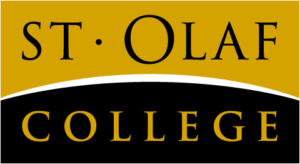
Northfield, MinnesotaFarm Size: 1.5-acres
Crop Types: Mixed Crops, Fruits, Flowers, Herbs, Berries
Final Score: 11Located in Northfield, Minnesota, St. Olaf College is a private, not-for-profit and Evangelical Lutheran Church in America-affiliated liberal arts college that was originally established in the year of 1874 by a group of Norwegian-American immigrant pastors and farmers, who were led by Pastor Bernt Julius Muus. St. Olaf College is named after the King and the Patron Saint Olaf II of Norway.
The St. Olaf Garden Research and Organic Works Farm (STOGROW) is a 1.5-acre area that is reserved for sustainable and organic agricultural projects, farming and research. The farm provides students with experiential learning opportunities and provides students and the surrounding community with affordable, low-cost organic produce that is fresh from the farm.
Program’s Webpage: https://wp.stolaf.edu/naturallands/agriculture/

Santa Cruz, CaliforniaFarm Size: 36-acres (combined)
Crop Types: Mixed Crops, Fruits, Flowers, Herbs
Final Score: 11The University of California – Santa Cruz (which is commonly referred to as UC of Santa Cruz or simply as UCSC) is a public land-grant and space-grant research university which was originally established in the year of 1965 and is located in Santa Cruz, California. In the year of 2008, the University of California – Santa Cruz agreed to house the repository of Grateful Dead archives in the school’s McHenry Library.
The Center for Agroecology and Sustainable Food Systems is a 3-acre garden area and a 33-acre farming area that is reserved for sustainable and organic agriculture. The farm provides the school’s students with experiential agricultural learning opportunities, research possibilities and with fresh, quality produce. The school’s faculty and the surrounding communities are also able to purchase the organic produce at a low-cost at yearly farmer’s markets.
Program’s Webpage: https://casfs.ucsc.edu/

Oroville, CaliforniaFarm Size: 85-acres
Crop Types: Mixed Crops, Hay, Fruit, Red Wine Grapes
Final Score: 12Located in Oroville, California, Butte College is a is a two-year, public postsecondary educational institution and is fully accredited by the Western Association of Schools and Colleges, and which has satellite campuses located in the cities of Chico and Orland. Butte College was originally established in the year of 1967 by the voters of Butte County after they passed the 1960 Donahoe Act.
Butte College Farm is an 85-acre farm that is utilized for organic, sustainable crop production, student experiential learning opportunities and organic, sustainable agricultural practice research. The farm produces several foods, which are available to the school’s students, faculty, and the surrounding communities at a low-cost. The area is also a wildlife preserve, featuring grasslands, wetlands, and woodlands and is home to many species of animals such as birds, foxes, bears and mountain lions.
Program’s Webpage: https://www.butte.edu/departments/careertech/agriculture/Wildlife%20Refuge.html

Doylestown, PennsylvaniaFarm Size: 156-acres
Crop Types: Mixed Crops, Fruit
Final Score: 12Located in Doylestown, Pennsylvania, Delaware Valley University (which is commonly referred to as DelVal) is a private college that was originally founded in the year of 1896. The school’s founder and first president, Joseph Krauskopf, was an activist and Reform Rabbi who hoped to train Jewish immigrants in the surrounding area as farmers.
The Delaware Valley University Student Farm is a 156-acre area that is used to grow various crops, fruit trees and as a place to learn and research different farming techniques. The farm also produces crops for the surrounding area and the school’s students.
Program’s Webpage: https://www.delval.edu/continuing-and-professional-studies/credit-certificate-programs/organic-farming-program

Slippery Rock, PennsylvaniaFarm Size: 83-acres
Crop Types: Mixed Crops, Flowers, Herbs, Fruits
Final Score: 12Located in Slippery Rock, Pennsylvania, Slippery Rock University (which is commonly referred to as The Rock or simply as SRU) is a public research university. SRU, which was originally founded in the year of 1889 as Slippery Rock State Normal School. Since 1960, SRU has been able to grant undergraduate degrees and graduate degrees in the liberal arts and the professions.
The Robert A. Macoskey Center for Sustainable Systems Education and Research is an 83-acre area designated for sustainable farming and energy research and instruction. The program was created in 1990 to promote sustainability at the school and in the local community. The program is committed to growing and providing organic, sustainable crops for both the nutrition aspect and the ecological impact aspect.
Program’s Webpage: https://www.sru.edu/offices/macoskey-center
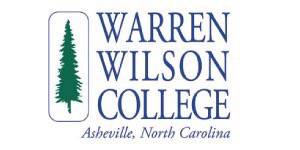
Swannanoa, North CarolinaFarm Size: 275-acres
Crop Types: Mixed Crops, Livestock
Final Score: 12A private, four-year liberal arts college located in Swannanoa, North Carolina, Warren Wilson College, was originally established in the year of 1894 by the Women’s Board of Home Missions of the Presbyterian Church. Originally known as the Asheville Farm School, the school still has strong ties to its agricultural roots to this day.
The Warren Wilson College Garden and College Farm is a 275-acre area that is set aside for growing sustainable and organic crops and for raising organic livestock. The school’s students use the area for agricultural research and learning opportunities, and the fruits of their labor are provided to the other attending students and the city’s community in the form of cheap, fresh produce.
Program’s Webpage: https://www.warren-wilson.edu/farm/
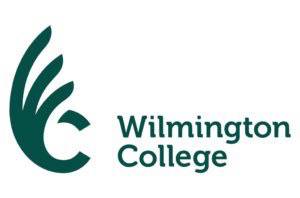
Wilmington, OhioFarm Size: 265.2-acres
Crop Types: Mixed Crops, Livestock
Final Score: 12Established in 1870 by the Quakers and located in Wilmington, Ohio, Wilmington College is a private, not-for-profit career-oriented liberal arts college. Accredited by the North Central Association, Higher Learning Commission and known for its Agricultural academic program (one of two in the entire state of Ohio), Wilmington College is a popular choice for many young farmers in the state.
The Wilmington College Academic Farms are a 265.2-acre (combined) area reserved for sustainable and organic agricultural practices, experiential learning opportunities for students and research opportunities for students and faculty. The farms produce crops that can be purchased by students, faculty and the surrounding communities.
Program’s Webpage: https://www.wilmington.edu/academics/areas-of-study/agriculture/academic-farms/

Chambersburg, Pennsylvania
Farm Size: 50-acres
Crop Types: Mixed Crops, Flowers, Herbs, Fruits
Final Score: 12Wilson College, which is located in Chambersburg, Pennsylvania, is a private, Presbyterian-affiliated liberal arts college. Wilson College was originally established in the year of 1869 and, for the first 144 years of the school’s history, operated solely as a women’s only postsecondary educational institute. The school has numerous undergraduate degree-granting programs and professional certification programs available for students to enroll in.
Fulton Farm is a 50-acre area designated for growing sustainable and organic crops such as vegetables, gourds, herbs, various specimens of flowers and fruit orchards. The farm provides sustainable farming internship opportunities, research opportunities and organic produce for the school’s students and the surrounding community.
Program’s Webpage: https://www.wilson.edu/fulton-farm

Chico, CaliforniaFarm Size: 800-acres
Crop Types: Mixed Crops, Livestock, Flowers
Final Score: 13Located in Chico, California, California State University – Chico (which is commonly referred to as CSU Chico) is a public research university that was originally established in the year of 1887 as the Northern Branch State Normal School of California, which later changed to Chico State Teachers College in 1921 and then to Chico State College in 1935 before finally being named California State University – Chico in 1972.
CSU – Chico’s Agricultural Research and Teaching Center is an 800-acre area that is designated for sustainable and organic farming and cattle-raising. The farm provides the school’s students with experiential agricultural opportunities, research opportunities and fresh produce, which is also available to the local communities at a low-cost. The farm has areas set aside for livestock grazing, and areas for growing various vegetable crops and flower specimens.

Poultney, VermontFarm Size: 17-acres
Crop Types: Mixed Crops, Herbs, Flowers, Eggs, Raw Milk, Livestock
Final Score: 13Located in Poultney, Vermont, Green Mountain College (which is commonly referred to as GMC) is a private, liberal arts college. Originally established in the year of 1834 as Troy Conference Academy, the school has always maintained a relationship with the United Methodist Church and is still a Methodist-affiliated postsecondary educational institute today. The school offers around 25 majors across a variety of disciplines.
The Green Mountain College Organic Farm at Cerridwen Farm is a 17-acre area (2-acres of crops and 15-acres of pasture land) that is designated for organic and sustainable farming practices, research, and instruction. The farm provides Green Mountain College’s students and the surrounding area with organic produce.
Program’s Webpage: https://www.greenmtn.edu/sustainability/sustainability-2020/

Craftsbury Common, VermontFarm Size: 410-acres
Crop Types: Mixed Crops, Herbs, Flowers
Final Score: 13Located in Craftsbury Common, Vermont, Sterling College is a private work college. The school, which was originally established in the year of 1958 as a boys’ preparatory school by former Berkshire School faculty member Norman Rioux, offers various environmental-related academic courses to enrolled students, and the various programs are focused on things such as sustainability, ecology, and agriculture.
The Sterling College Farm is a 410-acre area — comprised of 5-acres of gardens, 20-acres of pasture land and 390-acres of woodland — that is designated for organic and sustainable farming. The farm provides approximately 25% of all of the food eaten on campus, mostly vegetables, meats, eggs, herbs and fruits.
Additionally, goods from the farm are sold to the local community. Almost 1/4 of the entire student body works on the farm yearly, gaining valuable hands-on experience.
Program’s Webpage: https://www.sterlingcollege.edu

Poughkeepsie, New YorkFarm Size: 500-acres
Crop Types: Mixed Crops, Herbs, Flowers
Final Score: 13Vassar College is a private, coeducational and liberal arts college located in the town of Poughkeepsie, New York. Vassar College was originally founded in 1861 by Matthew Vassar, and it was the first degree-granting institution of higher education for women in the United States. It became coeducational in 1969.
The Poughkeepsie Farm Project is a 500-acre area that produces many different organic vegetables, herbs, and various flower specimens. The farm provides both students and the surrounding community with share and pick-your-own opportunities, allowing them to purchase the farm’s quality organic products.
Program’s Webpage: https://www.farmproject.org/
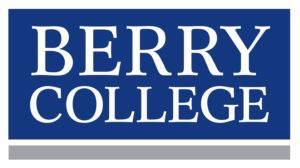
Mount Berry, GeorgiaFarm Size: 1,875-acres
Crop Types: Livestock, Herbs, Mixed Crops, Dairy
Final Score: 14Located in Mount Berry, Georgia (just north of Rome, Georgia), Berry College is a private, Christian-affiliated liberal arts college. Founded in 1902 by Martha Berry–an educator from Jackson County, Alabama–the school provides students with a Christ-centric liberal arts education ranging across multiple disciplines.
The Berry College Animal Sciences Student Work Program is a program with the goal of teaching students about basic and advanced agricultural techniques, sustainable farming practices and animal husbandry. The program is taught on 1,875-acres of land–375-acres of crops, 500-acres of pastures and 1,000-acres of cultivable land.
Program’s Webpage: https://www.berry.edu/academics/science/ans/studentorg/
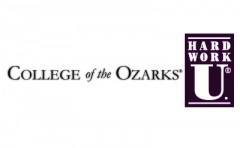
Point Lookout, MissouriFarm Size: 2,154-acres
Crop Types: Mixed Crops, Fruits, Livestock, Dairy
Final Score: 14With a campus in Point Lookout, Missouri and another in Hollister, Missouri, the College of the Ozarks is a private, liberal arts and Christian-affiliated (specifically Presbyterian) College that was originally established in the year of 1906 by James Forsythe, the then-pastor of the Forsyth, Missouri Presbyterian Church. The school charges no tuition for attending full-time students, due to its student work program. The work program requires students to work 15 hours a week at an on-campus work station and two 40-hour work weeks during school breaks.
The College of the Ozarks Dairy Farm is a 2,154-acre area that is utilized for sustainable and organic crop growing and sustainable and organic livestock raising. The farm raises both beef cattle, milking cows, pigs and grows various fruits and vegetables; all of which are available (and at an affordable cost) to the surrounding communities and the school’s students and faculty.
Program’s Webpage:
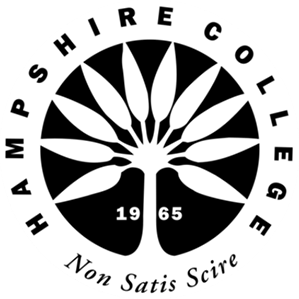
Amherst, MassachusettsFarm Size: 85-acres (combined; 20 produce, 65 livestock)
Crop Types: Mixed Crops, Livestock, Honey, Syrup, Dairy, Hay
Final Score: 14Hampshire College is a private, liberal arts college located in Amherst, Massachusetts. Hampshire College was originally established in the year of 1970 as an experiment in alternative education, in association with four other colleges that are located in the Pioneer Valley; Amherst College, Smith College, Mount Holyoke College and the University of Massachusetts – Amherst.
The Hampshire College Agricultural Studies Farm Center is an 85-acre farm that produces fresh produce, maple tree sap, eggs, and honey. All of the crops produced on the farm are completely sustainable, and the farm grows more than 25 different vegetables.
Program’s Webpage: https://www.hampshire.edu/areas-of-study/agricultural-studies-and-rural-life

San Luis Obispo, CaliforniaFarm Size: 3,211-acres (combined)
Crop Types: Mixed Crops, Herbs, Flowers, Fruits, Livestock
Final Score: 15California State Polytechnic University – San Luis Obispo (which is commonly referred to as Cal Poly – San Luis Obispo) is a public space-grant university that is located in San Luis Obispo, California. This school was originally established in the year of 1901 as a vocational high school known as the California Polytechnic School and was founded by Myron Angel, a historian, and journalist.
The Cal Poly Organic Farm is an 11-acre area where a variety of sustainable and organic vegetables are grown. The school has a secondary farm–Swanton Pacific Ranch–that is also utilized and is 3,200-acres in size. The farms provide students with both experiential learning opportunities and with research opportunities into organic and sustainable agricultural techniques. The farms also provide the school’s students and faculty and the surrounding communities with organic, low-cost and fresh produce.
Program’s Webpage: https://www.spranch.org/

British Columbia, CanadaFarm Size: 99-acres
Crop Types: Mixed Crops, Herbs, Flowers, Fruits, Berries, Eggs, Honey
Final Score: 15The University of British Columbia (which is commonly referred to as UBC) is a public research university with campuses and facilities located throughout British Columbia, Canada. Originally founded in the year of 1908 by Henry Marshall Tory, the first President of numerous postsecondary educational institutes such as Carleton College and Khaki University, as the McGill University.
The UBC Farm is a 99-acre area designated for sustainable and organic crop production. The area provides the school’s students with experiential agricultural experiences and organic and sustainable crop research opportunities. In addition, the farm sells its crops to the school’s students and faculty and the residents of the surrounding communities through farmer’s markets, CSA programs and by wholesale, at an affordable cost.
Program’s Webpage: https://www.landfood.ubc.ca/ubcfarm/

Deep Springs, CaliforniaFarm Size: 155-acres
Crop Types: Mixed Crops, Fruits, Livestock, Hay, Dairy, Eggs
Final Score: 16Located in Deep Springs, California, Deep Springs College is a private two-year college that was originally established in the year of 1917 by L. L. Nunn, an industrialist who built alternating current power plants across the western United States. The school is highly isolated, with the nearest town located an hour travel by car over a mountain pass, and is committed to teaching students self-sufficiency.
The Ranch, The Farm, The Garden is a 155-acre area that is designated for sustainable and organic agricultural practices. The farm is utilized for feeding the school’s students and faculty, which is due to the school’s self-sufficiency roots. Livestock–most notably beef cattle and milking cattle–are raised in pastures and portions of the farm are used for growing alfalfa hay for feeding the animals. The farm features hoop houses, orchards, cultivable land, and fields.
Program’s Webpage: https://www.deepsprings.edu/labor/

Raleigh, North CarolinaFarm Size: 2,245-acres
Crop Types: Mixed Crops, Herbs, Flowers, Honey, Livestock, Dairy
Final Score: 16North Carolina State University (which is commonly referred to as NCSU) is a public, land-grant, sea-grant and space-grant research university and is located in Raleigh, North Carolina. Originally established in the year of 1887 with a small class size, NCSU is currently the largest university in the Carolinas based on student enrollment.
The Center for Environmental Farming Systems Student Farm is a 2,245-acre area designated for sustainable, organic agriculture production, research, and teaching. The farm produces crops for the school’s students–used in the school’s dining hall–and for the surrounding community at an affordable price, with all proceeds used to increase The Center for Environmental Farming Systems Student Farm’s output and operations.
Program’s Webpage: https://cefs.ncsu.edu/
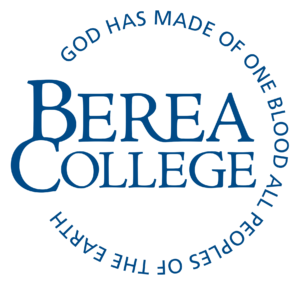
Berea, KentuckyFarm Size: 500-acres
Crop Types: Mixed Crops, Livestock, Microlivestock, Fish, Honey, Herbs, Fruits
Final Score: 17Located in Berea, Kentucky, Berea College is a liberal arts work college that was originally founded in the year of 1855. Berea College is the first college located in the southern region of the United States to be both coeducational and racially integrated. In addition, the school charges no tuition fees. All students that are admitted are provided with a four-year, full tuition scholarship.
The Berea College Farms is a 500-acre area consisting of pastures, croplands, gardens, woodlots and ponds and which produces sustainable and organic beef, honey, flowers, herbs, fruits and vegetables for the school’s students and the surrounding community. It also provides instruction and research opportunities on sustainable agricultural practices.
Program’s Webpage: https://www.berea.edu

Santa Rosa, CaliforniaFarm Size: 196-acres
Crop Types: Mixed Crops, Herbs, Flowers, Livestock, Fruits, Berries, Olives
Final Score: 17Santa Rosa Junior College (which is commonly referred to as SRJC) is a community college that is located in the city of Santa Rosa, California. Santa Rosa Junior College was originally founded in the year of 1918, and it is the tenth oldest community college in the state. Santa Rosa Junior College was modeled as a “junior” version of nearby University of California, Berkeley and acts as a feeder school.
The Ecological Agriculture Center at Robert Shone Farm is a 196-acre area (100-acres of pasture land, 80-acres of vineyards, 12-acres of crop production and 4-acres of orchards) that is reserved for sustainable and organic agricultural practices. The farm provides Santa Rosa Junior College’s students with experiential farming experiences and sustainable and organic research opportunities, in addition to fresh produce.
Program’s Webpage: https://maps.santarosa.edu/directions-srjc-shone-farm
Related Rankings:
